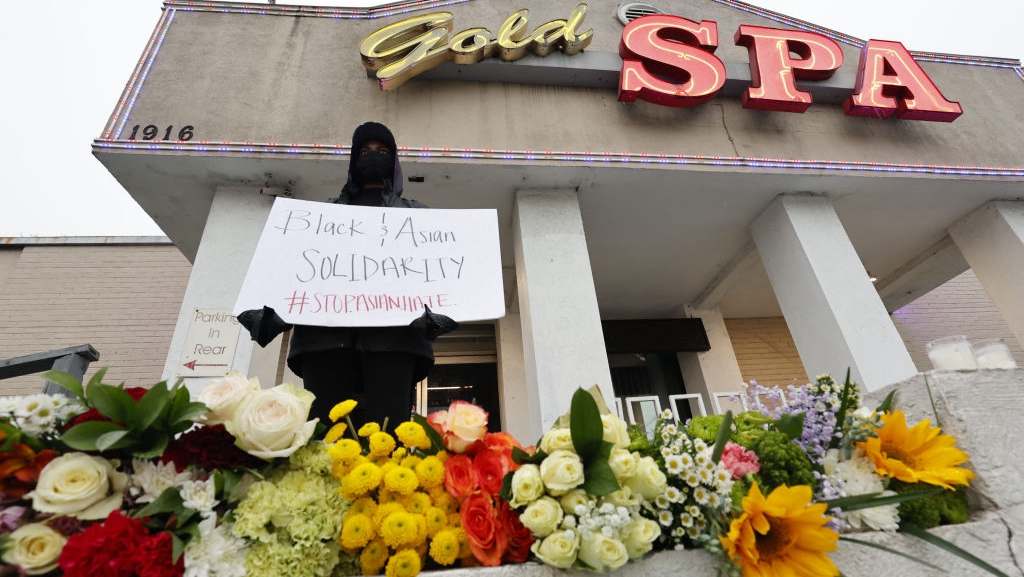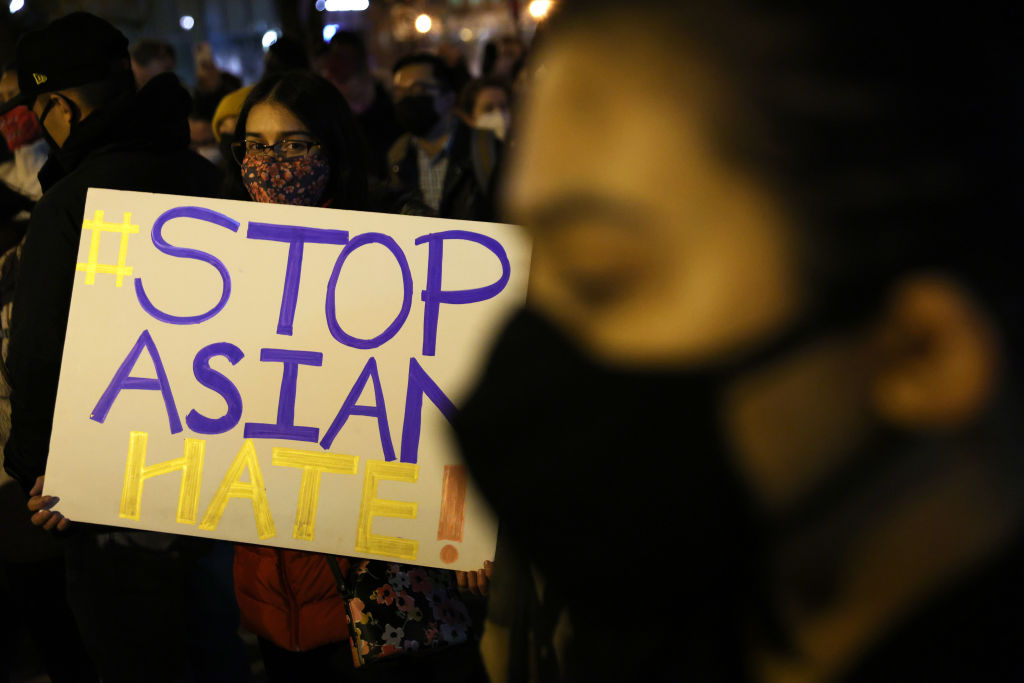
Kat Bagger shows her support for the Asian community as she stands in front of Gold Spa, one of three locations where deadly shootings happened at three-day spas, in Atlanta, Georgia, U.S. March 17, 2021. /Getty
Kat Bagger shows her support for the Asian community as she stands in front of Gold Spa, one of three locations where deadly shootings happened at three-day spas, in Atlanta, Georgia, U.S. March 17, 2021. /Getty
Editor's note: Bradley Blankenship is a Prague-based American journalist, political analyst, and freelance reporter. The article reflects the author's opinions and not necessarily the views of CGTN.
Another tragedy occurred in America this week when eight people were shot dead at spas in the Atlanta area, at least six of them being women of Asian descent.
Though the exact motivation for this unspeakable crime may be "sex addiction," according to investigators, it still raises concerns about the increase in anti-Asian hate crimes in America.
Last year, the United Nations issued a report on these "racist attacks and other xenophobic incidents…. as well as alleged lack of measures by the U.S. authorities to effectively combat such incidents." The FBI has been tracking these incidents, and while the official numbers from the agency have not yet been released, the advocacy group Stop AAPI Hate said that it received over 2,800 reports of hate incidents directed at Asian Americans in 2020.
Though indeed a sad situation, it shouldn't surprise anyone. FBI data from 2019 suggests that the U.S. hit its highest level of hate crimes in over a decade at that time, which has been widely attributed to former President Donald Trump's presidency. Trump was an open bigot and brought racial relations to a historic low, incited violent mobs and dog-whistled to white supremacists.
The Asian American community, however, was put under serious threat by Trump's rhetoric on COVID-19 and his confrontational approach with China. He invoked racism to deflect blame towards Beijing for his own government's monumental failure to contain the country's COVID-19 outbreak – an outbreak that has now resulted in the death of over 500,000 Americans – and to up the ante in pressuring Beijing.
For hundreds of years, people have blamed "others" for disease outbreaks, and this same sentiment has led to belligerently racist policies in America before against people of Asian descent.
A similar situation happened from 1900-1904 when San Francisco had a bubonic plague outbreak that was blamed on the city's Chinese community and spurred decades of resentment.
In 1902, the already-existing Chinese Exclusion Act of 1882, which banned all Chinese immigrants for a set period, was strengthened and made permanent with the Geary Act until it was overturned decades later.

Activists participate in a vigil in response to the Atlanta spa shootings in the Chinatown area of Washington, DC, March 17, 2021. /Getty
Activists participate in a vigil in response to the Atlanta spa shootings in the Chinatown area of Washington, DC, March 17, 2021. /Getty
Let's also not forget, however, that this sentiment has much deeper roots than the pandemic. For too long, politicians across the American political spectrum have unfairly blamed China, as well as many other countries, for the loss of American jobs.
This has fomented extreme xenophobia, the likes of which helped Trump become president in the first place, and allowed leaders to obfuscate the country's real systemic problems.
For example, leaders have failed to address the fact that the country's infrastructure is collapsing; that a structural unemployment crisis looms due to a skill deficit caused by Americans lacking access to proper training and education; or that the average American life expectancy is declining because the country lacks a national health care system and what health care access exists is rationed based on wealth.
Just like the COVID-19 pandemic, these are all real problems that need real consideration – not scapegoating.
The administration of President Joe Biden, a man who is often seen as an ally by minorities because of his role in the administration of former President Barack Obama, the country's first black president, seems not to understand how his political posturing is translating into hate.
To be sure, Biden is not whipping up crowds of white supremacists, chanting racist slogans, or aggressively blaming China for COVID-19, at least not to the extent that Trump did. But his administration's insistence on perpetuating fanatical conspiracy theories, for example, that the novel coronavirus may have originated in a Chinese lab, which has been dismissed by the WHO, leaves the door open for irrational hatred.
Biden and his team are also keeping the idea alive that China is stealing American innovation through intellectual property theft. While not as extreme as Trump's position that Chinese Americans have dual loyalties or that somehow all Chinese students in America are spies, it is still dangerous and false. Consider that over 100,000 people of Japanese descent, mostly Japanese Americans, were held in concentration camps during World War II over these kinds of accusations.
U.S. Secretary of State Antony Blinken will soon meet top Chinese officials for the first time in Alaska, which will probably not yield any significant results if the administration's posturing before the meeting – for example, Blinken's statements during his Asia trip before the meeting – is any indication.
But the Biden administration needs to understand that its actions abroad have consequences for communities back home, which is yet another reason why normalization in China-U.S. relations is critical.
(If you want to contribute and have specific expertise, please contact us at opinions@cgtn.com.)

